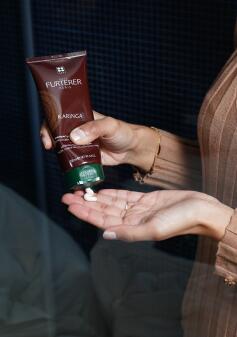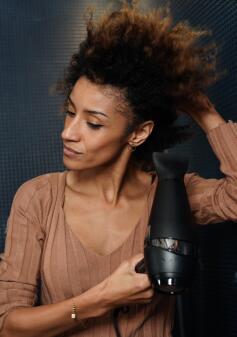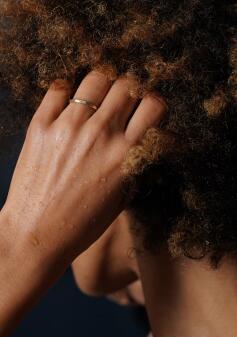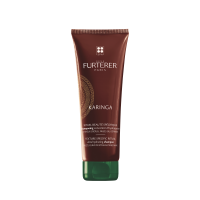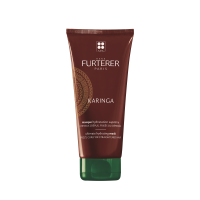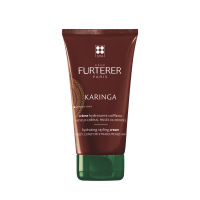Rediscovering the true nature of my coiled hair
She fluffs her hair with one gesture. This beautiful volume is "my material to sculpt" she says, smiling. Nathalie is of mixed French and Togolese origin, and wears a bold natural afro cut with gracefulness. A hairdresser and make-up artist for the audiovisual, advertising and event industries, she loves her brushes as much as her scissors and will always consider beauty in its entirety. Her tiny curls bounce around her face and give off an infectious energy. She, her fine hair and her mischievous eyes are one and the same. But that wasn't always the case. By letting her coiled hair go natural 12 years ago, Nathalie has learned to understand it. And to recognize herself.
How would you describe your hair?
My hair is a bit crazy, unruly, I would say. But that's its nature, you have to accept it that way. It can be tamed but not completely. I am mixed race, Togolese-French. My hair is also mixed. In one place it can be very curly, in another place it can be slightly straighter, it can curl in one direction or the other... My hair improvises, it likes to surprise me. You have to get to know it and lead it in the right direction.
Have you always loved your hair?
Now I love it. But I hated it for a long time. This hair didn't fit, it wasn't right. My mother and grandmother taught me to hide it. From a very young age, I straightened my hair. I braided it, with extensions. And then little by little, I asked myself the question: why is this rejection, which is quite widespread, even within the black community? Why is it passed down from generation to generation? So I looked into it, and I found an interesting book by a West Indian sociologist, Juliette Smeralda: “Peau noire, cheveu crépu: l'histoire d'une alienation” (“Black skin, frizzy hair: the history of an alienation”). I realized that it goes back to the time of slavery. And it’s this relationship, between the dominant and the dominated, that has forever changed the relationship that black people have with their hair. Today, these stigmas have been passed down, without anyone really paying attention. No one, not even my closest friends, had ever seen my real hair. And then one day I really discovered it.

No one, not even my closest friends, had ever seen my real hair.

What happened 12 years ago?
A very dear friend, a hairdresser who was in make-up school with me, said to me one day: "You'd look better with a pixie cut, you know." I answered him "We're not in the 80s, so no thanks, it's not for me." And then he finally convinced me. I was going through a break-up at the time. I was very unhappy. And like most of the time, when you're at rock bottom, you say to yourself: I want to change everything. So I told him: do what you want. And then he cut it all off. Well, I continued to cry but I wasn't sure if it was the break-up or the haircut or both. (Laughs). I didn't like it, but anyway, I let it go. I felt I had to go through it. And it grew back. Very coiled. People would stop me in the street; they'd say "Wow, it’s like Michael Jackson, it’s amazing!” But I thought, well, it's my hair!
How did you learn to tame it?
Before I could love my hair, I had to get to know it myself. And that's a general problem: we've never learned to understand our own hair, because we've never left it au naturel. I quickly realized that it was an extraordinary material—very creative to work with. My hair has texture in itself. Both strong and fragile. There are certain things you have to do.
Do you play with different styles?
Yes, I often do a kind of mohawk, adding two or three barrettes; it's very quick. I love to pull it up. I also like to make little knots all over my head. I didn't know this, but it's apparently a typical hairstyle in Africa, especially in my country, Togo. And I still like to braid my hair. But it's to change up my hairstyles, not to hide my natural hair!
What do you want to convey today as a hairdresser?
The love of this type of hair. But it goes even further: to love yourself, to accept yourself and your origins. Afro hair is a real pleasure to work with. There are plenty of hairdressers who are afraid of it, but I, on the contrary, will jump on it. Because you can do a lot of things with it, you can sculpt it as you like. It holds itself, you don't need to crimp it to give it shape; the volume is already there.

Afro hair is a real pleasure to work with.







